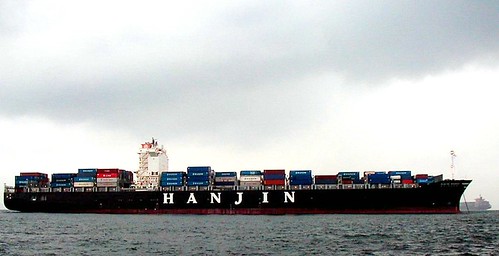By the time you read this, we should be aboard the MV Hanjin Madrid, a container ship traveling from the Seattle to Yokohama, Japan. (See our live position!) Neither of us has been at sea before (paddleboats on Lake Merritt don't count), but travel by ship used to be the backbone of transcontinental travel. We remember old family stories, like that of Barnali's uncle, who sailed from India to England in the 1940s--a long journey, and a major event in the family. Jet age travel has made our journeys easier, and yet more abrupt.
Our ship will take 10 days to sail from Seattle to Yokohama. The MV Hanjin Madrid is a container ship, carrying containers of cargo around the Pacific (Hong Kong, China, Japan, Canada, US, and back). We'll be staying in an officer's room about 320 square feet (30 square meters) in size, consisting of a bedroom, living area, and attached bathroom. The ship's officers are mostly German, and the crew mostly Filipino. We'll eat with everyone else, and are expected to basically stay out of their way, as they do their work.
A ship isn't a simple substitute for a plane. If we were to fly, we could go to any number of places at a whim, with few restrictions. But the effect on our carbon footprint? Huge! By choosing not to fly, we're forced to be more deliberate about where we go, and how long we stay. The prospect of taking slower modes of transportation (ships, buses, and trains) made it easier for us to decide to go to fewer places, staying longer at each location. We also hope that avoiding flying (and using more common and affordable modes of travel) will give us opportunities to interact with a broader cross-section of people, helping make more visible everyday political and geographic boundaries.
We discovered freighter travel when seeking alternatives to carbon-spewing international air travel. It's relatively obscure, the province of adventurous travelers, shipping geeks, people unable or afraid to fly, and more recently, green-minded travelers. So is freighter travel really greener than flying? Container ships are substantially more efficient at moving goods relative to airplanes. From our position, because a container ship carries cargo, we're essentially hitching a free ride. Our presence and our dollars are insignificant when compared to the amount and value of goods being transported, so our choice to travel or not travel by freighter won't affect the success or failure of the route, unlike with passenger air travel, where reductions in passenger utilization can lower the number of flights. Unfortunately, cargo ships are still responsible for tremendous levels of conventional pollution, though there are efforts to address this. Freighter ships are definitely climate-unsustainable, though less so than planes.
This is not green travel, nor guilt-free travel, but it's the first of our experiments in greener international travel, as we try to understand what it means to try living without aviation.
As we sit here typing, we're both a little anxious about the trip. Barnali's thinking about safety, and not being connected. Anirvan's worried about having eleven days of email piled up when he gets to Japan. It probably says something about us and our lives, that we can't leave our phones and Internet connections for a week without getting antsy. On the other hand, we're excited about seeing night skies full of stars, ocean waters as far as the eye can see, and the chance to try something very new for us, armed with books (him) and hot sauce (her) to keep us grounded.
(Next post: Life on a freighter ship)

Leave a comment